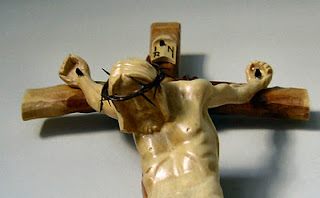In trying to explain the Cross, Paul once said, "Where sin increased, grace abounded all the more." During this last week of Lent, the Gospel readings focus us on the first part of Paul's statement.
In the Gospel for last Tuesday we heard John's version of the story of Judas' betrayal of Jesus and the prediction of Peter's denials as well. For weeks before this we had been hearing stories of a growing darkness and threat centered on the person of Jesus. Pharisees and Scribes were irritated and angry with Jesus at the facile way he broke Sabbath rules or his easy communion with and forgiveness of sinners. That he spoke with an authority the people recognized as new and surpassing theirs was also problematical. Family and disciples failed to understand him, thought him crazy, urged him to go to Jerusalem to work wonders and become famous.
Even his miracles were disquieting, not only because they increased the negative reaction of the religious leadership and the fear of the Romans as the darkness and threat continued to grow alongside them, but because Jesus himself seems to give us the sense that they are insufficient and lead to misunderstandings and distortions of who he is or what he is really about. "Be silent!" we often hear him say. "Tell no one about this!" he instructs in the face of the increasing threat to his life. Futile instructions, of course, and, as those healed proclaim the wonders of God's grace in their lives, the darkness and threat to Jesus grows; The night comes ever nearer and we know that if evil is to be defeated, it must occur on a much more profound level than even thousands of such miracles.
 In the last two weeks of Lent, the readings give us the sense that the last nine months of Jesus' life and active ministry was punctuated by retreat to a variety of safe houses as the priestly aristocracy actively looked for ways to kill him. He attended festivals in secret and the threat of stoning recurred again and again. Yet, inexplicably "He slipped away" we are told or, "They were unable to find an opening." The darkness is held at bay, barely. It is held in check by the love of the people surrounding Jesus. Barely. And in the last safe house on the eve of Passover as darkness closes in on every side Jesus celebrated a final Eucharist with his friends and disciples. He washed their feet, reclined at table with them like free men did. And yet, profoundly troubled, Jesus spoke of his impending betrayal by Judas. None of the disciples, not even the beloved disciple understood what was happening. There is one last chance for Judas to change his mind as Jesus hands him a morsel of bread in friendship and love. God's covenant faithfulness is maintained.
In the last two weeks of Lent, the readings give us the sense that the last nine months of Jesus' life and active ministry was punctuated by retreat to a variety of safe houses as the priestly aristocracy actively looked for ways to kill him. He attended festivals in secret and the threat of stoning recurred again and again. Yet, inexplicably "He slipped away" we are told or, "They were unable to find an opening." The darkness is held at bay, barely. It is held in check by the love of the people surrounding Jesus. Barely. And in the last safe house on the eve of Passover as darkness closes in on every side Jesus celebrated a final Eucharist with his friends and disciples. He washed their feet, reclined at table with them like free men did. And yet, profoundly troubled, Jesus spoke of his impending betrayal by Judas. None of the disciples, not even the beloved disciple understood what was happening. There is one last chance for Judas to change his mind as Jesus hands him a morsel of bread in friendship and love. God's covenant faithfulness is maintained.
 But Satan enters Judas' heart and a friend of Jesus becomes his accuser --- the meaning of the term Satan here --- and the darkness enters this last safe house of light and friendship, faith and fellowship. It was night, John says. It was night. Judas' heart is the opening needed for the threatening darkness to engulf this place and Jesus as well. The prediction of Peter's denials tells us this "night" will get darker and colder and more empty yet. But in John's story, when everything is at its darkest and lowest, Jesus exclaims in a kind of victory cry: [[ Now the Son of Man is glorified, and God is glorified in him!]] Here as darkness envelopes everything, Jesus exults that authentically human being is revealed, made known and made real in space and time; here, in the midst of the deepening "Night" God too is revealed and made fully known and real in space and time. It is either the cry of a messiah who will overcome evil right at its heart --- or it is the cry of a madman who cannot recognize or admit the victory of evil as it swallows him up. In the midst of these days of death and vigil, we do not really know which.
But Satan enters Judas' heart and a friend of Jesus becomes his accuser --- the meaning of the term Satan here --- and the darkness enters this last safe house of light and friendship, faith and fellowship. It was night, John says. It was night. Judas' heart is the opening needed for the threatening darkness to engulf this place and Jesus as well. The prediction of Peter's denials tells us this "night" will get darker and colder and more empty yet. But in John's story, when everything is at its darkest and lowest, Jesus exclaims in a kind of victory cry: [[ Now the Son of Man is glorified, and God is glorified in him!]] Here as darkness envelopes everything, Jesus exults that authentically human being is revealed, made known and made real in space and time; here, in the midst of the deepening "Night" God too is revealed and made fully known and real in space and time. It is either the cry of a messiah who will overcome evil right at its heart --- or it is the cry of a madman who cannot recognize or admit the victory of evil as it swallows him up. In the midst of these days of death and vigil, we do not really know which.
 At the end of these three days we call Triduum we will see what the answer is. Today, the day we call "Good," the darkness intensifies. During the night Jesus was arrested and "tried" by the Sanhedrin with the help of false witnesses, desertion by his disciples, and Judas' betrayal. Today he will be brought before the Romans, tried, found innocent, flogged in an attempt at political appeasement and then handed over anyway to those who would kill him by a fearful self-absorbed leader whose greater concern was for his own position. There is betrayal, of consciences, of friendships, of discipleship and covenantal bonds on every side but God's. The night continues to deepen and the threat could not be greater. Jesus will be crucified and eventually cry out his experience of abandonment even by God. He will descend into the ultimate godlessness, loneliness, and powerlessness we call hell. The darkness will become almost total. We ourselves can see nothing else. That is where Good Friday and Holy Saturday leave us. And the question these events raises haunts the night and our own minds and hearts: messiah or madman? Is Jesus simply another person crushed by the cold, emptiness, and darkness of evil --- good and wondrous though his own works were? (cf Gospel for last Friday: John 10:31-42.) We Christians wait in the darkness today and tomorrow. We fast and pray and try to hold onto hope that the one we called messiah, teacher, friend, beloved, brother and Lord, was not simply deluded --- or worse --- and that we Christians are not, as Paul puts the matter, the greatest fools of all.
At the end of these three days we call Triduum we will see what the answer is. Today, the day we call "Good," the darkness intensifies. During the night Jesus was arrested and "tried" by the Sanhedrin with the help of false witnesses, desertion by his disciples, and Judas' betrayal. Today he will be brought before the Romans, tried, found innocent, flogged in an attempt at political appeasement and then handed over anyway to those who would kill him by a fearful self-absorbed leader whose greater concern was for his own position. There is betrayal, of consciences, of friendships, of discipleship and covenantal bonds on every side but God's. The night continues to deepen and the threat could not be greater. Jesus will be crucified and eventually cry out his experience of abandonment even by God. He will descend into the ultimate godlessness, loneliness, and powerlessness we call hell. The darkness will become almost total. We ourselves can see nothing else. That is where Good Friday and Holy Saturday leave us. And the question these events raises haunts the night and our own minds and hearts: messiah or madman? Is Jesus simply another person crushed by the cold, emptiness, and darkness of evil --- good and wondrous though his own works were? (cf Gospel for last Friday: John 10:31-42.) We Christians wait in the darkness today and tomorrow. We fast and pray and try to hold onto hope that the one we called messiah, teacher, friend, beloved, brother and Lord, was not simply deluded --- or worse --- and that we Christians are not, as Paul puts the matter, the greatest fools of all.
We have seen sin increase to immeasurable degrees; and though we do not see how it is possible we would like to think that Paul was right and that grace will abound all the more. And so, we wait. Bereft, but hopeful, we wait.
17 April 2014
Messiah or Madman? We Wait in the Darkness (Reprise)
Posted by
Sr. Laurel M. O'Neal, Er. Dio.
at
11:21 PM
![]()
![]()
Labels: Good Friday, Holy Saturday, Triduum







































